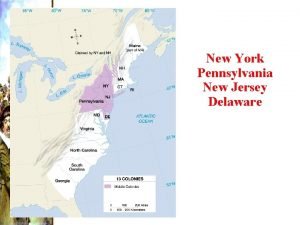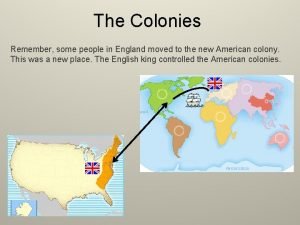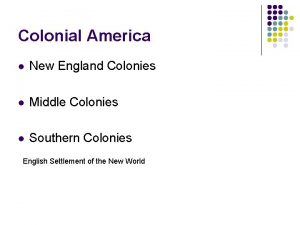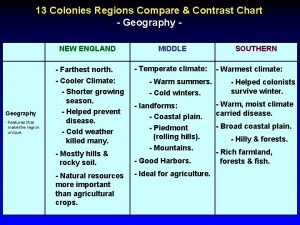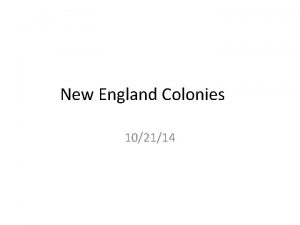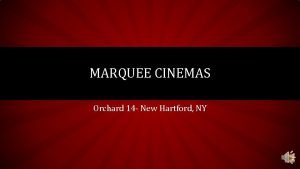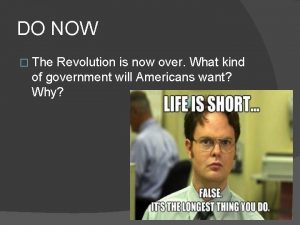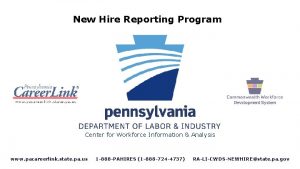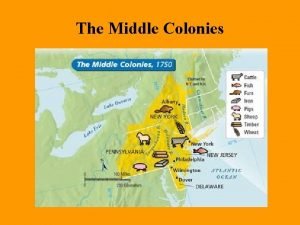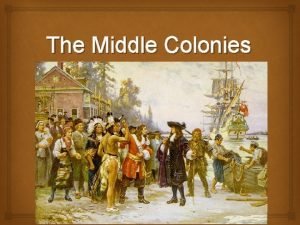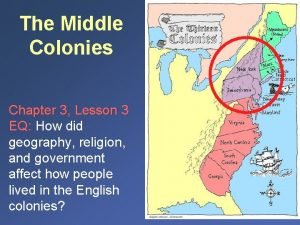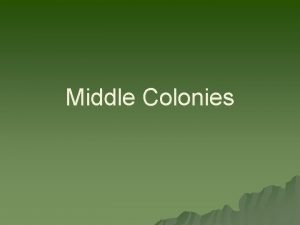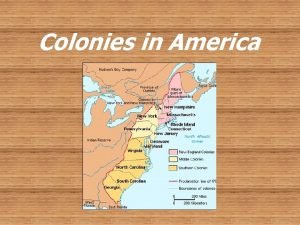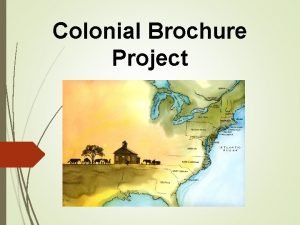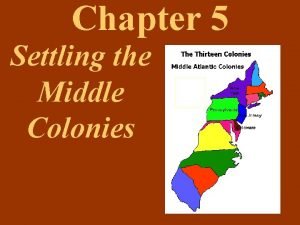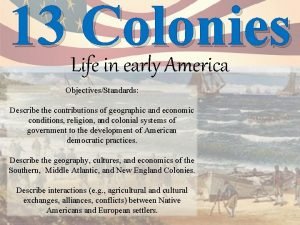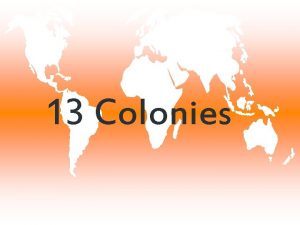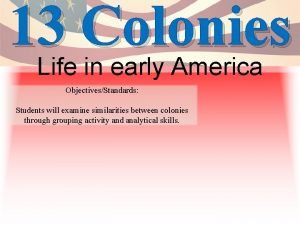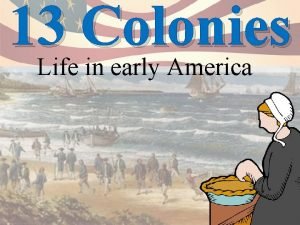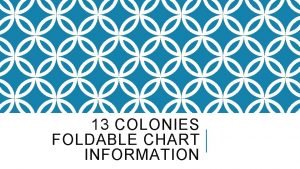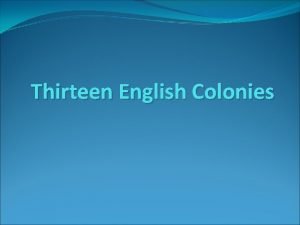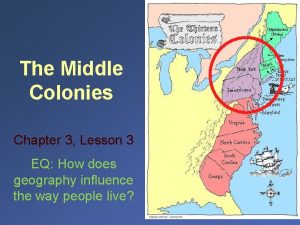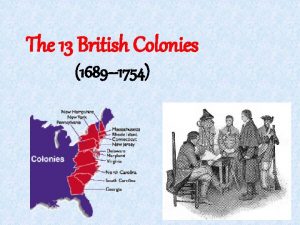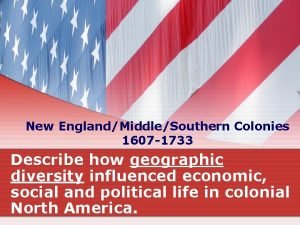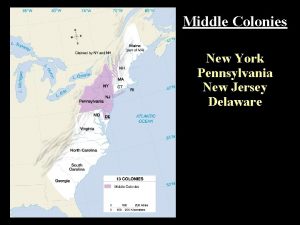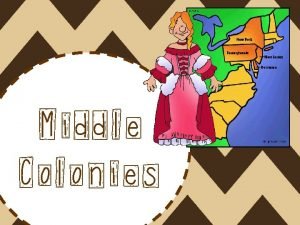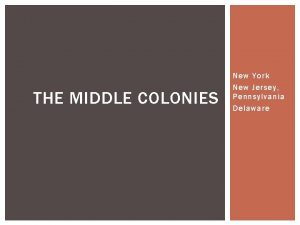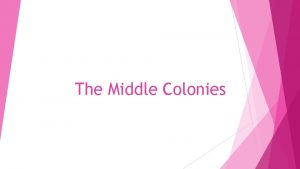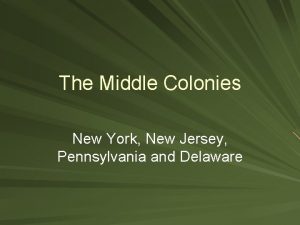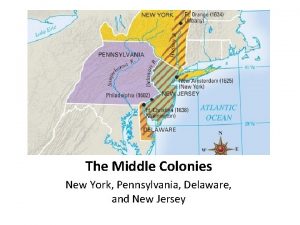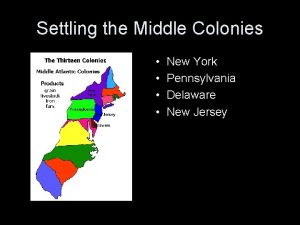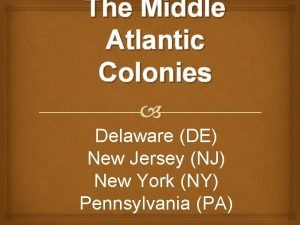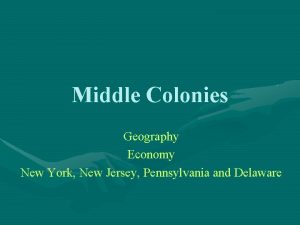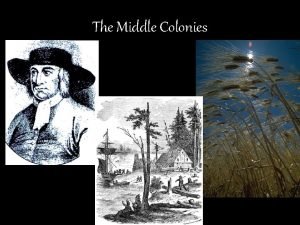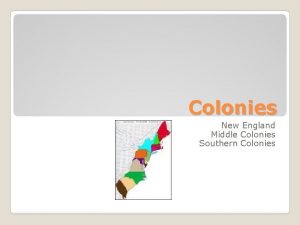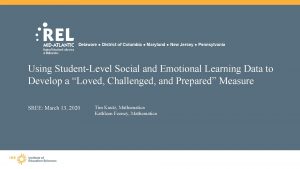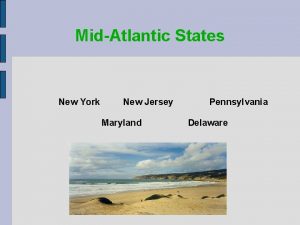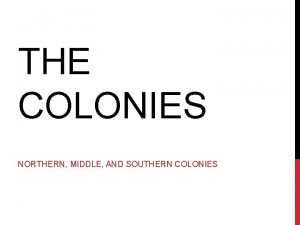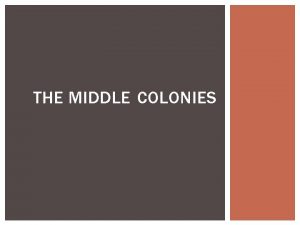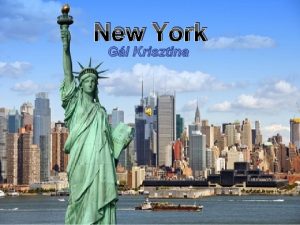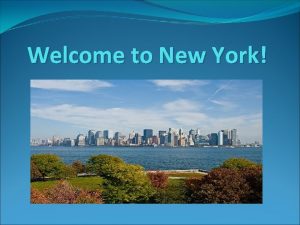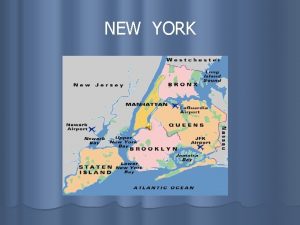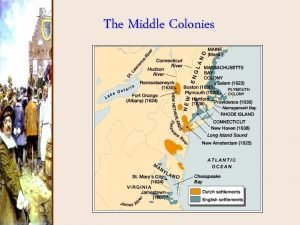Middle Colonies New York Pennsylvania New Jersey Delaware




























- Slides: 28

Middle Colonies New York Pennsylvania New Jersey Delaware


Middle Colonies 1. River systems 2. Valleys – fertile soil 3. ”Bread basket" large farms - surplus food 4. diverse population 5. manufacturing 6. iron mines, glass, shipyards, and paper 7. Cities: New York and Philadelphia Middle Colonies

THE GEOGRAPHY OF THE MIDDLE COLONIES

Plains, Hills, and Rivers • The Middle Colonies formed a region of contrasts because New Jersey and Delaware lie on the Atlantic Coastal Plain and New York and Pennsylvania stretch across the Appalachians. So they had different land lifestyles. • There was a fall line created as the rivers dropped from the hills to the coastal plain. This caused rapids and waterfalls.

Plains, Hills, and Rivers cont. • The middle colonies had beaverfilled streams, thick forests and rich farm land. • Colonist used the rivers to transport these goods. • The fall line was used to power mills and saws.

Plains, Hills, and Rivers cont. • The most important rivers in the Middle Colonies were the Delaware and the Hudson rivers. • They were large enough for ships which promoted port cities for trade. – Example: New York City

Farming the Middle Colonies • There was rich soil and a 6 to 7 month growing season that made farming easy in the middle colonies.

Urban Population Growth 1650 - 1775

New Netherland (New York) is first established by the Dutch • 1609: Henry Hudson sailing for Dutch East India Company sails into Hudson river looking for passage through continent ~ claims area for Dutch • “Bought” Manhattan from Indians

English immigration to New Netherland resulted in 1/2 total population • The English regarded Dutch as intruders • New York was a royal gift to James, the King’s brother (aka Duke of York) • Thus, when the English invaded, the leader of the Dutch colony, Peter Stuyvesant, gave up without a fight. • Allowed to remain, the Dutch made up a large segment of New York’s population for many years.

John Peter Zenger • Zenger published a weekly newspaper called “The New York Weekly journal. ” • Zenger was arrested because he published a newspaper about the governor being dishonest. • The trial helped to establish freedom of the press. • As long as it was true, you could find fault with public officials. • http: //www. youtube. com/watch? v=a Wzmsu. B 0 J_4

New Jersey Lord John Berkeley • James gave 2 friends, Lord John Berkeley and Sir George Carteret, the section of New York located between the Hudson River and Delaware Bay in 1664 – He felt the territory of New York was too large to administer • Both proprietors allowed religious freedom and an assembly in addition to giving generous land offers to attract settlers

• Mid-1600 s: religious dissenters named Quakers arose in England • Hated by authorities because they refused to pay taxes to Church of England, refused to take oaths, refused military service

William Penn, a Quaker, was a close friend of King Charles II, and Charles granted Penn what became Pennsylvania. • Charles II perceived the egalitarian Quakers as dangerous radicals & desired to export the Quakers to someplace far from England

Royal Land Grant to Penn

q. Penn governs the colony q. Advertised in Europe, promising land & freedoms q. Frame of Government (guaranteed elected assembly), Charter of Liberties (freedom of worship, open immigration), fair treatment of Native Americans


Penn’s Treaty with the Native Americans

Penn & Native Americans Penn attempted to treat Native Americans more fairly than did other colonies. n Penn’s treatment of the Native Americans was so fair that Quakers went to them unarmed and even employed them as babysitters n

Pennsylvania & Neighbors • However, as non-Quaker immigrants came, they were less tolerant of Indians (Scots-Irish) • Liberal features: elected assembly, no tax-supported church, freedom of worship, only 2 capital crimes

Ben Franklin’s Philly

Benjamin Franklin • 1 of 17 children born in Boston. (15 out of 17) • Worked at his brother’s printing press. • His brother made money while he worked so he ran away for Philadelphia. • Philadelphia was nosy and exciting to him. • It was busy all day long.

A City of Opportunity • In Philadelphia, Ben owned a print shop and published his own paper by the age of 24. • Franklin wrote the Poor Richard’s Almanac which was the best selling book in the colonies. • An almanac is a book of facts on many subjects. His taught farmers how & when to plant crops.

A City of Opportunity • Workshops lined the streets of Philadelphia. • Craftworkers made good to be sold. • The Delaware River was lined with docks built by merchants. • Ships left Philadelphia with, fur, meat, lumber, and grain. • They returned with goods, from England like, silks, lace, swords, and mouse traps.

Franklin’s Improvements on Philadelphia • Benjamin Franklin started America’s first public library in Philadelphia in 1731. Any money collected was used to buy more books for the library. • Franklin also started fire companies. • Benjamin worked for paved streets and street lights so it would be safer at night. • The largest city in the colony was Philadelphia in 1760. • Philadelphia, being the center of a farming region, grew rapidly. • Visitors enjoyed Philadelphia’s well lit streets and fine appearance.


Colony/Date Person Responsible New Netherland In 1609 --Dutch Henry Hudson for Netherlands New York— 1664 England Duke of York of England names it New York New Jersey---1702 Pennsylvania— 1681 Delaware--1682 Indian land---Dutch and Swedish gift from King Charles II to brother James--gives to his friends Lord John Berkeley & Sir George Carteret William Penn Swedes Why Founded Governed/Owner English fleet takes New Amsterdam from Dutch in 1664 and becomes New York City---Good harbor for trade New Netherlands was an autocracy 1689 ---English Bill of Rights Representative Govt Royal Colony Attract new settlers for Dutch and Swedish colonists Royal Colony Penn founded for religious freedom for the Quakers---Holy Experiment—invited all people Representative govt Royal Colony
 New york, new jersey, pennsylvania, and delaware
New york, new jersey, pennsylvania, and delaware Site:slidetodoc.com
Site:slidetodoc.com L
L 13 colonies religion chart
13 colonies religion chart New england, middle and southern colonies comparison chart
New england, middle and southern colonies comparison chart Marquee theater new hartford ny
Marquee theater new hartford ny 3 weaknesses of the articles of confederation
3 weaknesses of the articles of confederation Neil thisse is a loyalist who fled the colonies
Neil thisse is a loyalist who fled the colonies Pennsylvania new hire reporting
Pennsylvania new hire reporting Important facts about the middle colonies
Important facts about the middle colonies Middle colonies economy
Middle colonies economy Physical geography of the middle colonies
Physical geography of the middle colonies What did the middle colonies do
What did the middle colonies do Who founded pa
Who founded pa Mid atlantic colonies
Mid atlantic colonies 13 colonies timeline
13 colonies timeline New england confederation
New england confederation New england colonies brochure
New england colonies brochure Middle colonies homes
Middle colonies homes Southern colonies facts
Southern colonies facts Important facts about the middle colonies
Important facts about the middle colonies Interesting facts about the middle colonies
Interesting facts about the middle colonies Important facts about the middle colonies
Important facts about the middle colonies 13 colonies religion chart
13 colonies religion chart Middle colonies climate/geography
Middle colonies climate/geography Lesson 3 the middle colonies answer key
Lesson 3 the middle colonies answer key Middle colonies
Middle colonies 1733-1607
1733-1607 Middle colonies postcard
Middle colonies postcard
